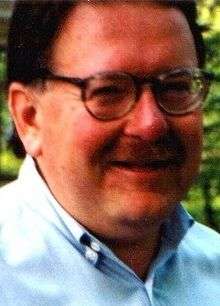Joe Herzenberg

Joseph Alexander Herzenberg, II (June 25, 1941 – October 28, 2007) was an American historian, political activist, advocate for social, environmental and economic justice, and the first openly gay elected official in North Carolina. Herzenberg was named Joseph Paul Herzenberg at birth, but took his grandfather's name when he was bar mitzvahed.[1] His parents were Marjorie and Morris Herzenberg.
Biography
Herzenberg was a native of Franklin, New Jersey. He received a B.A. in 1963 from Yale University and an M.A. in European History from Yale in 1965. Herzenberg was a Freedom Summer volunteer in Mississippi in 1964. He was appointed instructor and chair of the History Department at Tougaloo College (a historically black college in Jackson, Miss.) in 1965,[2] and was promoted to Assistant Professor at Tougaloo in the 1966-67 academic year.[3]
In 1969 Herzenberg moved to Chapel Hill, North Carolina, where he enrolled as a graduate student in history at the University of North Carolina at Chapel Hill, and completed his dissertation on the career of local civil rights leader Frank Porter Graham. He was narrowly defeated in a 1979 bid for the Chapel Hill Town Council, but was later appointed to the town council when councilmember Gerry Cohen stepped down following a failed bid for mayor. Herzenberg lost his reelection bid in 1981, and was unsuccessful again in 1983. In 1987, he ran again, and his victory that year that made him the first openly gay elected official in the state. He was reelected with overwhelming support in 1991, receiving an unprecedented vote total for Chapel Hill town council race. Herzenberg resigned from the town council in 1993 after it was revealed that he had not paid state income tax for the previous 14 years.
Herzenberg was a noted advocate for the environment, civil liberties, and the interests of low-income people. He was a founder of Equality NC PAC (originally NC Pride PAC), a statewide advocacy organization for lesbian, gay, bisexual, and transgender North Carolinians, and he served on its board for more than a decade.
After leaving the council in 1993, Herzenberg continued to serve the town on several advisory boards, including chairing the Town Greenways Commission and serving on the committee to rename Airport Road in honor of Martin Luther King, Jr. He played a great part in the enactment of Chapel Hill's tree protection ordinance, the creation of the Chapel Hill Greenways, and the preservation of the Chapel Hill downtown historic district. Herzenberg received the first Citizen's Award from the Independent Newsweekly in 1984. He died at the age of 66 on October 28, 2007 in Chapel Hill, from complications of diabetes.
An oral history conducted with Herzenberg in 1985 on the subject of the local Chapel Hill debate regarding the Cane Creek reservoir project is available with a full transcript for online listening at: . Herzenberg's diaries, personal and political papers are archived and fully accessible to the public at the Southern Historical Collection in Wilson Library at the University of North Carolina at Chapel Hill. A description of the collection can be viewed online at:
References
- ↑ email from Debbie Herzenberg, 11/5/2007
- ↑ Journal of Southern History, Vol. 32, No. 1, February 1966, page 140.
- ↑ Journal of Southern History, Vol. 32, No. 4, November 1966, page 576.
External links
- Inventory of the Joseph A. Herzenberg Papers, 1883-2006, in the Southern Historical Collection, UNC-Chapel Hill
- "Equality North Carolina Mourns the Loss of Joe Herzenberg" - obituary on Equality NC website
- "Former Chapel Hill councilman Herzenberg dies" - obituary in The News & Observer, October 29, 2007
- "We'll Miss You, Joe!" - comments and remembrances from friends and supporters on OrangePolitics.org
- Remembering Joe Herzenberg - blog celebrating Joe's life and times, including photos, audio links to Joe's oral history interviews, news articles, and video footage
- Oral History Interviews with Joseph A. Herzenberg , from Oral Histories of the American South
|